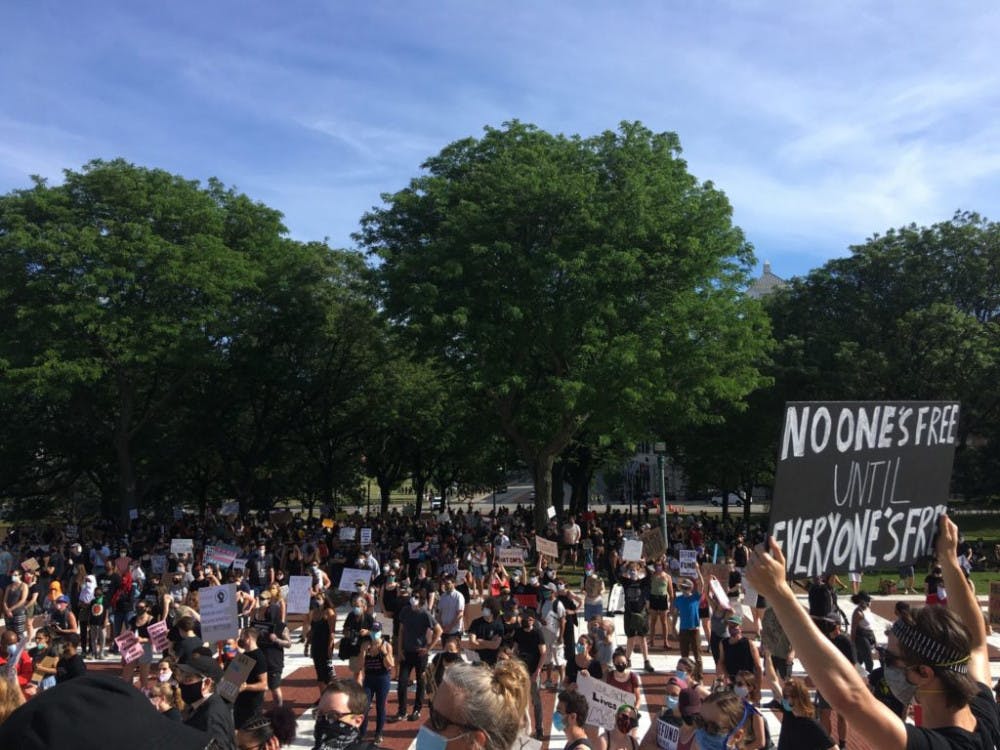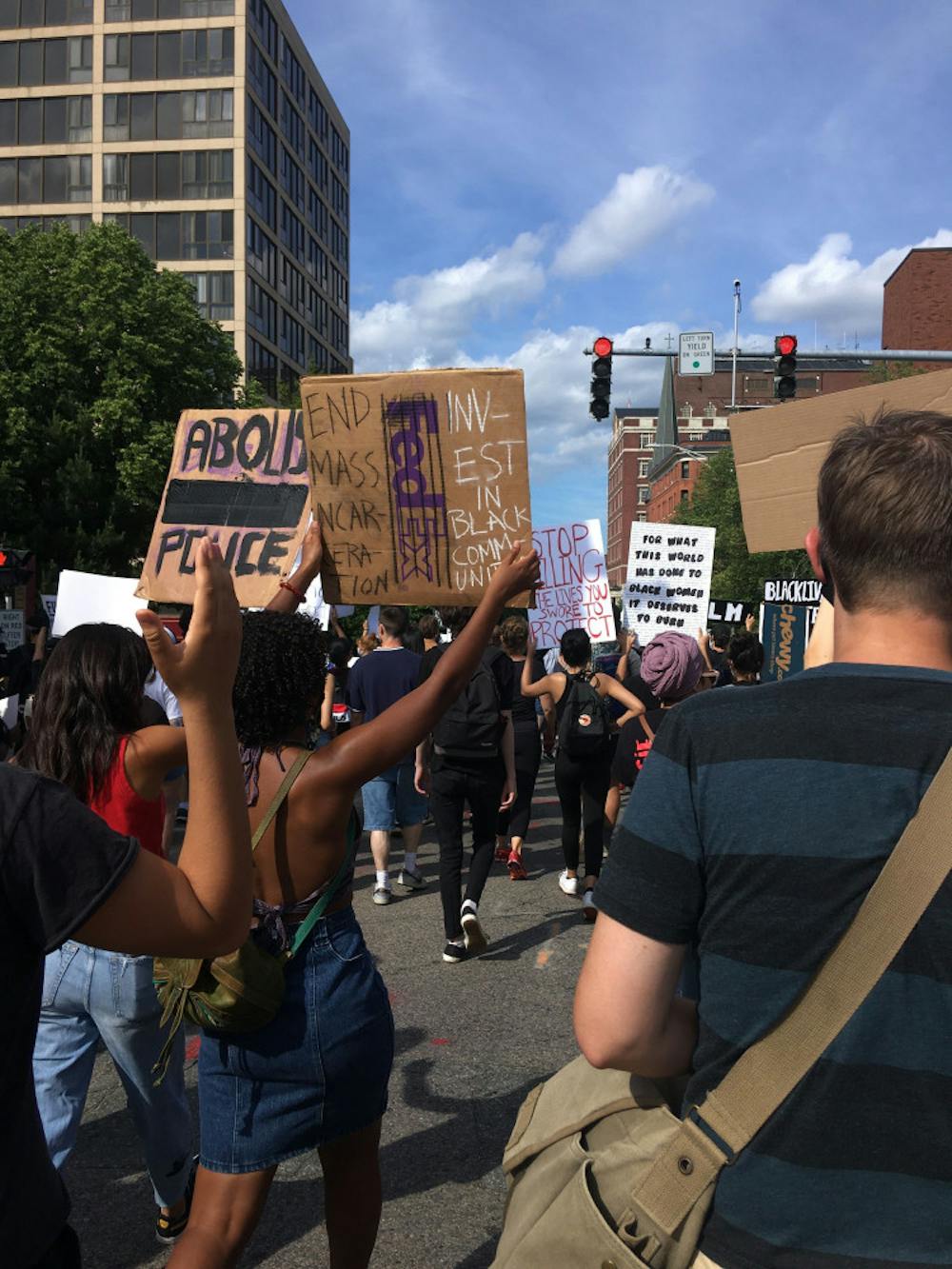The march to the Rhode Island State House was loud. The eight minutes and 46 seconds spent sitting on the State House steps were almost silent.
To recognize the 155th anniversary of Juneteenth, more than 1,000 protestors took part in a youth-led and organized rally in Providence Friday afternoon. Protestors demanded defunding and abolishing the police, extracting school resource officers (SROs) from schools and otherwise driving forward systemic change to end racial injustice and better support Black communities at the local, state and national level. Following a march and several speeches outside the State House, protestors staged a sit-in similar to others lasting the amount of time a white police officer held his knee on George Floyd’s neck, ultimately killing him during an arrest for allegedly using a counterfeit $20 bill.
Jayson Rodriguez, leadership team director for the Providence Student Union and a co-organizer of the protest, stressed the importance of directing money away from the police force and channeling it into communities. “I want to see the police defunded, I want to see more investment in communities,” he told The Herald, “specifically communities of color.”
In addition to dismantling “state and local policies that promote anti-Blackness,” Rodriguez, who is Black, stressed that specific change is needed in schools, where police officers or SROs should be replaced with a greater number of counselors and mental health resources, he said.
The protest Friday follows several others in Providence since Floyd was killed in Minneapolis May 25. Two weeks ago, a June 5 demonstration of over 10,000 people marked the largest in recent state history.
Demonstrators in Providence joined thousands more across the country who chose to celebrate Juneteenth with protest yesterday. Juneteenth commemorates June 19, 1865 — the day Union General Gordon Granger notified enslaved Black individuals in Galveston, Texas that they were free. While this occurred two months after the Confederate surrender and two and a half years after President Abraham Lincoln’s Emancipation Proclamation, the holiday has evolved into the oldest national celebration of the end of slavery. All but three states now recognize the holiday; Rhode Island has officially recognized Juneteenth since 2012.
Ana Duque, who is Latina, chose to close her small business in Pawtucket in recognition of Juneteenth and to attend the protest. She told The Herald that she believes Juneteenth should be a national holiday, which senators have proposed.
Duque echoed the demands of Rodriguez and other protestors for transformative systemic change. “We want to see the police get defunded and see these funds reallocated into all our communities,” she said, adding that funds should specifically be diverted to support education, health care and mental health resources.
Almost two hours before the sit-in began at the State House, protestors bearing signs and donning masks gradually filtered into a parking lot between Providence Career and Technical Academy and Classical High School. Many of the demonstrators who filled the space were young, and many offered extra signs, water and sunscreen to others as they waited for the rally to begin.
An organizer navigated the crowd on a skateboard, calling high schoolers and youth to the front to begin marching. As protestors walked through the streets empty of cars, they alternated between several now-familiar chants echoed across and beyond the country: “No justice, no peace, no racist police”; “Say his name: George Floyd”; “Say her name: Breonna Taylor.” Lines of police officers, some in riot gear and holding batons, blocked roads as they marched by. When crossing the Broad Street overpass on their way downtown, many protestors held up signs to the passing cars below, prompting an explosion of supportive honks.
The approximately mile-long walk to the State House culminated in impassioned speeches by several high school students. Local organizations Alliance of Rhode Island Southeast Asians for Education, Providence Student Union, Providence Youth Student Movement, Leadership Journey and Direct Action for Rights and Equality collaborated to organize the rally.
[caption id="" align="aligncenter" width="650" caption="Several students delivered speeches on the State House steps before protestors sat together in silence for eight minutes and 46 seconds."]
Speakers included Brandon Feliz, a rising senior at the Met High School, who challenged everyone to continue the protest momentum and incite decisive, lasting change. “These past few weeks? This is the easy part. What’s next?” Feliz asked the crowd.
“We as Black people come from queens and kings and monarchs. We built this country’s wealth. We built this country’s culture,” Felix said.
Feliz also addressed white allies: “Recognize your roots. Realize the pain our history has caused. And decide that these cycles of pain end with you.”
In addition to demanding an expansion of mental health and guidance support in schools to replace police officers, other speakers called for increased teaching of Black history in Rhode Island schools and greater support for the state’s homeless population.
To accompany the calls for action, Amanda Toussaint, founder of Progressive Reform Overrides Violence, Led by Generation Z, oversaw efforts to register protestors to vote at a table on the grass in front of the State House.
“Getting especially the youth registered and pre-registered to vote is going to directly allow us to control more of what’s happening in our community,” Toussaint, who is Black, told The Herald.
But one of the calls for action took a different form: Eugenie Belony performed a two-part original poem — “The Equation and the Answer” and “Ticking in Time.”
“I should be staying up all night studying for chem, instead of sobbing under my sheets at 1 a.m., wondering if this day is going to be my last.”
Belony, who also attended the protest led by youth organization Gen Z: We Want to Live on Sunday, told The Herald that “The Equation and the Answer” was motivated by the idea that “Everything is taught to us to always have an outcome of a goal. But sometimes for the Black community or minorities in general, we never are able to reach that goal because everything in front of us is always blocked.”
The second half of the performance, “Ticking in Time,” referred to “almost every day, or every year we always see an increase in Black and brown lives that have been shot, or have been killed or have gone missing. And so, our clock is ticking. And it’s something that I shouldn’t — I, especially me, as a 15-year-old — I shouldn’t have to be afraid for my life,” Belony said.
“The clock is ticking. And the glass walls are shattering. My bullets are words, and I will not go down in silence,” Belony’s poem ended, to thunderous applause.

ADVERTISEMENT




